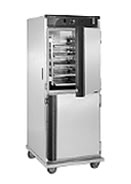Commercial Hot Food Holding Cabinets
Get Rebates,
Incentives & Services
Introduction

Hot food holding cabinets are used for keeping prepared food at safe serving temperatures during restaurant operations. Like refrigerators, they are often left on up to 24 hours a day, 365 days a year. Unlike refrigerators, these units typically hold food for long periods of time with minimal door openings. In addition, commercial kitchens use these cabinets for other secondary uses, such as keeping plates warm for service and transporting food for catering events. Given the constant usage of this equipment there is significant potential to save energy and money.
Technology Options
ENERGY STAR qualified hot food holding cabinets are approximately 50% more energy-efficient than standard models, while maintaining the same performance. Models that meet this requirement incorporate better insulation, reduced heat loss, and may also offer additional energy saving features such as magnetic door gaskets, auto-door closures, or Dutch doors. Improved insulation has the added benefit of maintaining more consistent food temperatures throughout the cabinet.
Key ENERGY STAR Product Criteria:
Maximum Idle Energy Rate = 40 watts/ft3
Currently, there are no federal standards for commercial hot food holding cabinets; however, there are some states that have implemented efficiency standards.
California State Standards
Definition of a Hot Food Holding Cabinet: “Commercial hot food holding cabinet means an appliance that is not a consumer product and that is designed to hold hot food that has been cooked in a separate appliance, at a specified temperature.”
Energy Efficiency Standards for Commercial Hot Food Holding Cabinets: “The idle energy rate of commercial hot food holding cabinets manufactured on or after January 1, 2006 shall be no greater than 40 Watts per cubic foot of measured interior volume.” (Note: Same as ENERGY STAR levels.)
Key Technology Definitions
Idle Energy Rate–Dry: The rate of appliance energy consumption while it is maintaining or holding at the control set point, without using a humidity-generating device (if applicable). For purposes of this specification, idle energy rate is measured in watts/ft3.
Hours of Operation: ENERGY STAR assumes that commercial hot food holding cabinets are used for 12 hours a day on the conservative side. However, many cabinets are used 24 hours per day, with most of these hours being spent idling. Limiting the hours of use will greatly reduce energy use and costs.
Product Life: A typical commercial hot food holding cabinet is expected to last about 12 years.
Efficiency Benefits
ENERGY STAR qualified hot food holding cabinets save approximately 2,600 kWh/year in energy when used 12 hours per day. This equates to a savings of approximately $350 annually on your California utility bill.
| Cost-Effectiveness Example | |||
| Conventional HFHC | Energy Star HFHC | Savings | |
| Annual Energy Consumption | 6,132 kWh/Year | 3,504 kWh/Year | 2,629 kWh/Year |
| Annual Energy Cost | $797.00 (CA) $613.00 (National) |
$456.00 (CA) $350.00 (National) |
$341.00 (CA) $263.00 (National) |
| Lifetime Energy Cost (12 year life) | $9,564.00 (CA) $7,356.00 (National) |
$5,472.00 (CA) $4,200.00 (National) |
$4,092.00 (CA) $3,165.00 (National) |
Source: Food Service Technology Center Energy Savings Calculator
In addition to saving energy, the insulation that comes with most ENERGY STAR qualified models allow the cabinets to radiate less heat into the kitchen, keeping the work environment more comfortable.
Manufacturers
A list of ENERGY STAR qualified hot food holding cabinet manufacturers can be found on ENERGY STAR’s web site.
Purchasing Tips
|
||









